God's Love for You: The Gospel of Jesus the Messiah
The World Around Us

Every person longs for happiness and love. This is the most basic desire present deep within every human heart - including yours.
Sometimes, the stunning beauty of the world around us awakens or increases within us this deep yearning for “more.” At other times we may be struck by the beauty and goodness of the people around us whom we know and love. We are fascinated by the mystery of humanity which often reflects so much truth, beauty and goodness.

Yet at the same time we also know that there is something terribly wrong with the world, so often marred by ugliness, evil and suffering. Everywhere we hear of poverty, illness, injustice, selfishness, anger, crime, violence, cruelty, and war, to the point that life can easily become filled with fear, loneliness, pain, hopelessness and despair. Many people try to temporary escape from this harsh reality through the elusive and artificial paradises of drugs, alcohol, or temporary relationships, but these in the end only increase our pain and alienation from the world. Sometimes we find comfort in genuinely good things, such as music, entertainment, sport, hobbies, work, friends, and family - yet deep down inside we know that these things cannot fully satisfy our restless heart.
Can we make any sense of this world, so beautiful yet wounded by so much evil and suffering?
God's Love for Creation
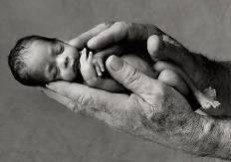
God, infinitely perfect and blessed in himself, in a plan of sheer goodness freely created man to make him share in his own blessed life. (CCC 1)
The good news is that God created the world* and everything in it - including you - out of infinite love. God is not just some impersonal force, but a personal God who knows you and loves you more than you could ever imagine. He knew you already while you were in your mother's womb:
For you created my inmost being; you knit me together in my mother's womb. (Ps 139:13)
He knows where you come from, where you have been, and where you are going. He also knows every single one of your thoughts, your hopes, your joys, your pains, and your fears:
O LORD, you have searched me and you know me. You know when I sit and when I rise; you perceive my thoughts from afar. You discern my going out and my lying down; you are familiar with all my ways. Before a word is on my tongue you know it completely, O LORD. (Ps 139:1-4)
God loves you with infinite love, just as He loves every person in the world, and He has a wonderful plan for you: He has created you so that you may participate in His own divine life of love (2 Pet 1:4) so that you could be happy with Him forever:
I have loved you with an everlasting love; Therefore with loving kindness I have drawn you. (Jer 31:3)
For I know the thoughts that I think toward you, says the LORD, thoughts of peace and not of evil, to give you a future and a hope. (Jer 29:11)
At the beginning of human history, God formed a covenant* with the human family - a sacred family bond, by which we are adopted as God's children whom He loves and cares for. God calls each one of us into this covenant relationship: to share friendship with Him and each other as His family, trusting and obeying Him in everything.
Our Freedom

Yet God does not impose Himself upon us, and He does not force us to love Him. True love must always be a gift freely given. God made us free so that we may be able to love Him and one another. Our freedom is a great gift, but because of this freedom we have the choice to receive God’s offer of life and love, or to reject it:
I call heaven and earth as witnesses today against you, that I have set before you life and death, blessing and cursing; therefore choose life, that both you and your descendants may live; that you may love the LORD your God, that you may obey His voice, and that you may cling to Him, for He is your life and the length of your days. (Deut 30:19-20)
Sin
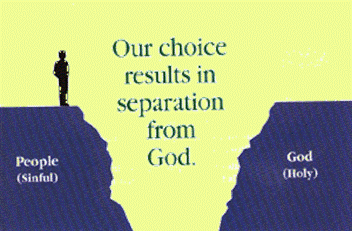 The bad news is that we have all broken God's covenant. Because we have the freedom to choose “not God,” sin* enters the world. Sin is the root of all the evil and suffering around us. We sin when we turn away from God, from His goodness and from His truth, and instead of obeying His commandments, we go our own way and act as we please, often in a selfish way, making wrong choices and living without having Him at the center of our life. Our sin causes a break in our relationship with God and separates us from Him and from his life. The Bible reminds us of something we already know: that we have all sinned, rebelled, and turned away from God, at least to some extent in our own lives:
The bad news is that we have all broken God's covenant. Because we have the freedom to choose “not God,” sin* enters the world. Sin is the root of all the evil and suffering around us. We sin when we turn away from God, from His goodness and from His truth, and instead of obeying His commandments, we go our own way and act as we please, often in a selfish way, making wrong choices and living without having Him at the center of our life. Our sin causes a break in our relationship with God and separates us from Him and from his life. The Bible reminds us of something we already know: that we have all sinned, rebelled, and turned away from God, at least to some extent in our own lives:

The LORD looks down from heaven on humankind to see if there are any who are wise, who seek after God. They have all gone astray, they are all alike perverse; there is no one who does good, no, not one. (Ps 14:2-3)
Behold, I was brought forth in iniquity; and in sin did my mother conceive me. (Ps 51:5)
For there is not a just man on earth who does good and does not sin. (Eccl 7:20)
All have sinned and fall short of the glory of God. (Rom 3:23)
Death
The terrible consequence of sin is death (Rom 6:23). We tend to treat death as the normal and inevitable end of life. Yet at the deepest core of our being we are terrified of death - of the possibility that we may cease to exist, or worse, that we may be eternally separated from the source of all love, all joy, all peace and all happiness. We have lost sight of the fact that, in the beginning, God had never intended death to be a normal part of life. Still, each one of us longs for immortality in some way. We all would like to live a life free of suffering, illness and death where we could enjoy without limit the good things of the world. And indeed, death is not our ultimate destiny. God has called us to life, life in all of its fullness. It is only because of the presence of sin in the world - our willful turning away from God - that death now reigns:

…but of the tree of the knowledge of good and evil you shall not eat, for in the day that you eat of it you shall surely die. (Gen 2:17)
Whoever has sinned against me I will blot out of my book. (Exod 32:33)
But your iniquities have separated you from God; and your sins have hidden His face from you, so that He will not hear. (Isa 59:2)
The soul that sins, it shall die. (Ezek 18:4)
Bridging the Gap
 Whether we believe in God or not, whether we are consciously aware that suffering and death are constantly looming over our fragile lives, we all bury ourselves in a flurry of activities to try to find peace within ourselves, to "make things right" with God and with others, to appease our conscience, to find a reason for our existence, and to leave our mark, in some way, in this brief life. We may try to do this through popularity, wealth, or power; through great learning, success in business, artistic creativity, or generous works of mercy; through philosophy, meditation, or religion.
Whether we believe in God or not, whether we are consciously aware that suffering and death are constantly looming over our fragile lives, we all bury ourselves in a flurry of activities to try to find peace within ourselves, to "make things right" with God and with others, to appease our conscience, to find a reason for our existence, and to leave our mark, in some way, in this brief life. We may try to do this through popularity, wealth, or power; through great learning, success in business, artistic creativity, or generous works of mercy; through philosophy, meditation, or religion.
Yet we are simply not capable on our own of repairing the break between us and God. He is infinitely holy, and we are sinful. Trying to bridge the infinite gap between us and Him is trying to jump over the English channel from France to England. Some of us will jump three feet; those in good shape may jump six feet, but all of us will fall infinitely short of reaching the goal. In the same way, the Bible tells us that our efforts, no matter how well intended, cannot of themselves overcome the infinite chasm between us and God and restore us to Him:
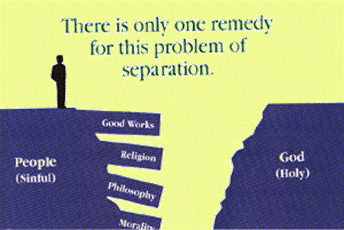
There is a way that seems right to man, but in the end it leads to death. (Prov 14:12)
Thus says the LORD: "Cursed is the man who trusts in man and makes flesh his strength, whose heart departs from the LORD.” (Jer 17:5)
No king is saved by the size of his army; no warrior escapes by his great strength. A horse is a vain hope for deliverance; despite all its great strength it cannot save. But the eyes of the LORD are on those who fear him, on those whose hope is in his unfailing love, to deliver them from death and keep them alive in famine. (Ps 33:16-19)
Unless the LORD builds the house, they labor in vain who build it; Unless the LORD guards the city, the watchman stays awake in vain. (Ps 127:1)
Our human nature is too wounded and too weak to return to the state of supernatural holiness and goodness in which God made us in the beginning. Who of us can overcome death by his good works? Though every natural act of goodness and generosity has value before God, His infinite holiness and perfection prevent us from coming into His presence because of our sin. Trying to live in His presence in our fallen state is more impossible than living on Mars. Just as we need special equipment to breathe and live on that planet, we also need new, supernatural powers in order to live again in God's presence and partake of His life.
God had to provide the way for us to return to Him. Only He can give us these supernatural powers.
Atoning Sacrifices
Long ago, God chose one people, the people of Israel, though whom He began to reveal Himself to the world in preparation for his great redemption of humanity from the damage caused by sin. God delivered Israel out of Egyptian slavery, adopted them as His own special people and gave them the Torah, the law by which they were to live as God’s people. The Israelites were bound to keep many commandments as a response in faith and obedience to God redeeming them and adopting them. Yet keeping commandments, though important, was never meant to be the exclusive way for Israel to earn their salvation. In order to be "right" with God, they needed to place their faith and trust in Him, keep the commandments, and participate in the tabernacle worship which included offering bloody animal sacrifices to atone for their sins.
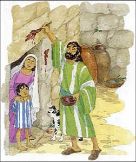 When God delivered the Israelites from slavery, He commanded them to slay a lamb and sprinkle its blood on the doorposts of their houses so that they would be protected from the angel of death who would strike the firstborn of the Egyptians (Exod 12). Later, the Israelites had to perpetually offer blood sacrifices on the altar of the tabernacle and temple to atone for their sins. On the Day of Atonement (Yom Kippur), the Holiest day of the Jewish year, the high priest had to enter the innermost part of the sanctuary, the Holy of Holies, with the blood of a goat which he was to sprinkle on the mercy seat, the seat of God's tangible presence, in order to atone for the sins of the people (Lev 16). Every day, while the Temple in Jerusalem stood, the blood of lambs was shed on the altar (Exod 29).
When God delivered the Israelites from slavery, He commanded them to slay a lamb and sprinkle its blood on the doorposts of their houses so that they would be protected from the angel of death who would strike the firstborn of the Egyptians (Exod 12). Later, the Israelites had to perpetually offer blood sacrifices on the altar of the tabernacle and temple to atone for their sins. On the Day of Atonement (Yom Kippur), the Holiest day of the Jewish year, the high priest had to enter the innermost part of the sanctuary, the Holy of Holies, with the blood of a goat which he was to sprinkle on the mercy seat, the seat of God's tangible presence, in order to atone for the sins of the people (Lev 16). Every day, while the Temple in Jerusalem stood, the blood of lambs was shed on the altar (Exod 29).
Why would God have ordained such a messy, bloody ritual? The book of Leviticus gives us the answer:
For the life of a creature is in the blood, and I have given it to you to make atonement for yourselves on the altar; it is the blood that makes atonement for one's life. (Lev 17:11)
As we have seen above, the wages of sin is death. Because we have sinned, we deserve to die. Our blood deserves to be shed. God's justice requires it. Yet God's mercy wishes to forgive us and to give us a new beginning every time we sin. If God would just wipe us out of existence this would be just, but not merciful. If He would just forgive us all at no cost, it would be merciful but not just - just think of how we naturally desire that those who do evil would be punished and that reparation would be made for wrongs done. This is the reason why God instituted the sacrifice of animals. The sin, guilt and punishment deserved by the sinner was transferred onto the animal sacrificed. Its blood would be shed instead of the blood of the sinner; it would die in his place. The blood of the sacrifice covered and atoned for the sins of the person who offered it, who would then be restored into fellowship with God. We can imagine the enormous cost of sheep and cattle being offered daily in the temple. This signified that sin has a heavy price; that price, however, was nothing in comparison to our debt towards God. Yet God deemed these sacrifices sufficient for the time, because they were but a foreshadow of a much greater sacrifice that was to come.
But 70 C.E., the Romans destroyed the Jerusalem Temple and brought a definitive end to the offering of sacrifices. Where is now the sacrifice that atones for the sins of Israel?
God's Solution: Jesus the Messiah
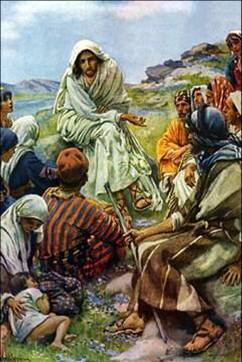
For God so loved the world that He gave His only begotten Son, that whoever believes in Him should not perish but have everlasting life. (John 3:16)
Fortunately, God provided a final, definitive and universal solution to fix our sin problem. Two thousand years ago, He sent His Son, called Yeshua (Jesus)*, the Messiah of Israel* , to form a New Covenant with Israel and to show us the way back to God. Jesus proclaimed repentance and the coming of the Kingdom of God. He healed sicknesses, forgave sins, and showed us how to live as children of God. He came for four principal reasons (CCC 457-460):
- He came to save us by reconciling us with God, through the offering of Himself as sacrifice for our sins;
- He came to reveal the Father’s love for us, through his words and deeds;
- He came to be our model of holinesss and to show us how to live as God's children: "love one another as I have loved you" (John 15:12);
- He came to make us partake of God’s life, as God had intended it from the very beginning.
Jesus the Savior

Jesus, the eternal Word and Son of God, took on our mortal nature and offered his life as an atoning sacrifice for our sins to reconcile us with God. His death on the cross was the Paschal sacrifice* that fulfilled all the sacrifices of the Old Covenant. He took on our punishment so that we may be set free and forgiven:
But He was wounded for our transgressions, He was bruised for our iniquities; The chastisement for our peace was upon Him, and by His stripes we are healed. All we like sheep have gone astray; we have turned, every one, to his own way; and the Lord has laid on Him the iniquity of us all. (Isa 53:5-6)
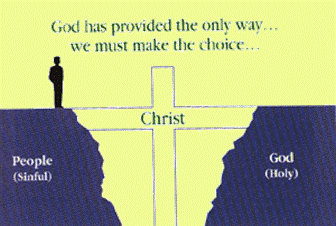
By dying, Jesus conquered sin and death. Yet His work did not stop there. On the third day, He was physically raised from the dead by the power of the Holy Spirit. He then sent the Holy Spirit to dwell within us to reconcile us and make us one with God (1 Cor 15:3-8, Rom 5:5) and reconcile us to one another. By His resurrection, Jesus opened the way for us to heaven and eternal life. The gates to paradise, which had been closed since the entrance of sin into the world, were opened again.
Jesus, true God and true man, is the bridge between God and man. He has come to reconcile us with God and give us a new life of faith, hope and love as beloved children of God the Father. If we accept Jesus and His message, we have accepted the fullness of God’s plan.
I am the way, the truth and the life. No one comes to the Father except through me. (John 14:6)
The Work of the Apostles
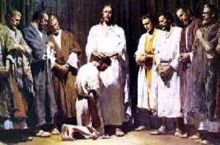
In the days when He ministered in the Galilee, Jesus called twelve apostles whom He prepared to continue his mission. He gave a special role to Simon, renaming him Peter, "the rock." Jesus gave the future leadership of the Church to Peter when He said to him:
You are Peter, and on this rock I will build My church, and the gates of Hades shall not prevail against it. And I will give you the keys of the kingdom of heaven, and whatever you bind on earth will be bound in heaven, and whatever you loose on earth will be loosed in heaven. (Matt 16:18-19)
On the day of Pentecost, forty days after the resurrection, the Holy Spirit came down on the apostles. This was the birth of the Church*. Initially, the Church was entirely made up of Jews who believed that Jesus is the promised Messiah of Israel. Soon after, the Church began to also receive Gentiles in her midst, and it became the "place" where Jews and Gentiles could be reconciled in their common worship of the God of Israel. The apostles, with Peter at their head, were the leaders of the early Church, who continued the work of Christ. As the Church grew, the apostles ordained bishops and passed on to them the spiritual authority* that Jesus had given them:
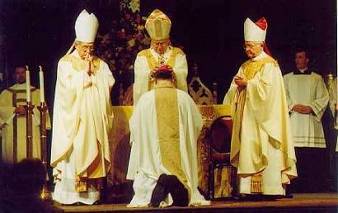
He who hears you hears Me, he who rejects you rejects Me. (Luke 10:16)
The things that you have heard from me among many witnesses, commit these to faithful men who will be able to teach others also. (2 Tim 2:2)
Today, the pope*, the successor of Peter, and the bishops are the successors of the apostles. Together they continue the work of Jesus and the apostles in teaching His words, administering the sacraments which convey Christ's life, and in governing the Church.
The New Birth
Jesus said that we must be born again, of water and the Spirit, to enter the kingdom of God:
Amen, amen, unless one is born again, he cannot see the kingdom of God... no one can enter the kingdom of God unless he is born of water and the Spirit. (John 3:3,5)
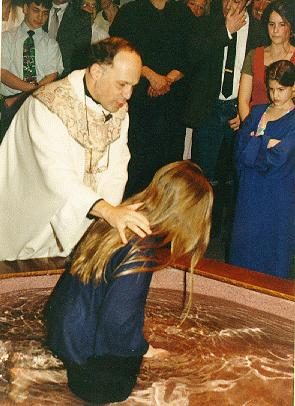 The new birth “of water and the Spirit” is faith in Christ and baptism*. Through baptism, we become members of the Church, the Body of Messiah. For Jews, to be baptized does not mean to forsake Judaism. On the contrary, baptism fulfills the promise God made to Israel through the prophet Jeremiah: "I will sprinkle clean water on you, and you shall be clean... I will give you a new heart and put a new spirit within you; I will take the heart of stone out of your flesh and give you a heart of flesh" (Ezek 36:25-26). Baptism is "the washing of regeneration and renewal by the Holy Spirit" (Tit 3:5) which cleanses us from our sins, identifies us with Christ's death and resurrection, restores us to friendship with God, and is the door to eternal life. Jesus himself said that faith in Him and baptism are essential for salvation; this is why He gave to his followers the Great Commission to go into all the world and make disciples of all nations, so that all may have a chance to turn away from sin and be reborn to eternal life in Christ:
The new birth “of water and the Spirit” is faith in Christ and baptism*. Through baptism, we become members of the Church, the Body of Messiah. For Jews, to be baptized does not mean to forsake Judaism. On the contrary, baptism fulfills the promise God made to Israel through the prophet Jeremiah: "I will sprinkle clean water on you, and you shall be clean... I will give you a new heart and put a new spirit within you; I will take the heart of stone out of your flesh and give you a heart of flesh" (Ezek 36:25-26). Baptism is "the washing of regeneration and renewal by the Holy Spirit" (Tit 3:5) which cleanses us from our sins, identifies us with Christ's death and resurrection, restores us to friendship with God, and is the door to eternal life. Jesus himself said that faith in Him and baptism are essential for salvation; this is why He gave to his followers the Great Commission to go into all the world and make disciples of all nations, so that all may have a chance to turn away from sin and be reborn to eternal life in Christ:
Go into all the world and preach the good news to all creation. Whoever believes and is baptized will be saved, but whoever does not believe will be condemned. (Mark 16:15-16)
The Catholic Church

Jesus founded the Catholic (universal) Church*, guided by the Holy Spirit and led by the successor of Peter, the pope*, to continue His work on earth. The Catholic Church is God’s worldwide family. Through the Church, called in the Bible the "pillar and foundation of truth," Jesus shares with us the way, the truth and the life that make us a new creation and restore us to divine sonship.
I write so that you may know how you ought to conduct yourself in the house of God, which is the church of the living God, the pillar and foundation of the truth. (1 Tim 3:15)
We are united with Christ and receive God’s life particularly in the liturgy* and sacraments* of the Church. Through these seven sacraments, beginning with baptism, the Holy Spirit comes to us in a powerful way and transforms us so that we may grow in God's likeness, goodness and love. The greatest of the sacraments is the Eucharist*: the sacrifice of the New Covenant and the family meal that nourishes us with Christ's own body and blood (John 6:51-58, Luke 22:19-20). The other sacraments are confirmation*, reconcilation (confession)*, the anointing of the sick*, matrimony*, and holy orders*.
Jesus also has given us his mother, Miriam (Mary)*, to be our own spiritual mother (John 19:27). Mary loves us, prays for us, watches over us from heaven and helps us in the battle against evil (Rev 12). As God’s children, we are earthly pilgrims heading home to heaven, our true homeland where we will share forever God’s life and love with him and with each other (Phil 3:20).
Our Response
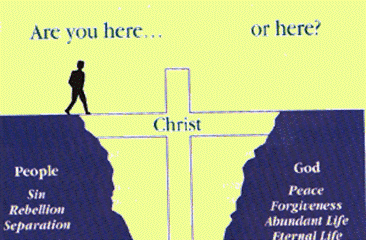
God calls us to repent by turning away from sin and selfishness, accept Jesus and believe in what He taught, choose to follow Him, and be baptized into new life. He calls us to join ourselves to his Body, the Church (Acts 2:38), so that we can grow in the likeness of God until we are ready to participate in His life in heaven forever.
This is our choice. Sin is a reality, and so is death. God is the source of all life. If we stubbornly reject Him in this life, then He will respect our choice and will allow us to remain separated from Him forever in the next life. This is hell, the "state of definitive self-exclusion from communion with God and the blessed" (CCC 1033). Jesus sternly warned about the existence of hell (Matt 13:41-42, 25:41), and exhorted us to...
Enter by the narrow gate; for wide is the gate and broad is the way that leads to destruction, and there are many who go in by it. Because narrow is the gate and difficult is the way which leads to life, and there are few who find it. (Matt 7:13-14)
It is not God's desire that anyone would be lost. He calls us to choose life and salvation. He has made us so that we may love Him and serve Him in this life, and be with Him together forever in heaven in a state of perfect fulfillment and happiness. May this be our choice to seek and find Him today.
For this is good and acceptable in the sight of God our Savior, who desires all men to be saved and to come to the knowledge of the truth. (1 Tim 2:3-4)
What to do Next
If you feel that God may be calling you into the Catholic Church:
- Build your relationship with God. Pray daily - speak with Him and ask Him to lead you and guide you into His truth and light.
- Study the Catholic faith, either with Catholics for Israel, or through other Catholic resources.
- Find a Catholic Church in the area and begin to attend Mass and to learn about Catholic prayer and liturgy.
- Get together with faithful Catholics who know and love their faith so that they can help you progress on your journey to God.
- Speak with a priest about your desire to become Catholic. Pay close attention to what he says, and make sure he is faithful to the Church. If you find that he dissents from any of the Church's teachings as taught in the Catechism, or tells you that you don't really need to become Catholic, leave and find another priest.
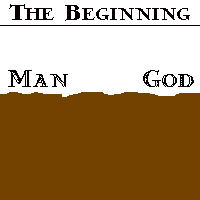
The Gospel of Jesus the Messiah in a Nutshell
- God loves you and has a wonderful plan for your life.
- Sin separates us from God. We are not capable of repairing this break on our own.
- Jesus has come to reconcile us with God and give us eternal life.
- Jesus has given us the Church though which he shares with us the way, the truth and the life.
- God calls us to repent, to choose to follow Jesus and to join ourselves to his Body, the Church.
See also:
The Gospel Message* (PowerPoint)
The Story of Salvation
Why be Catholic?
